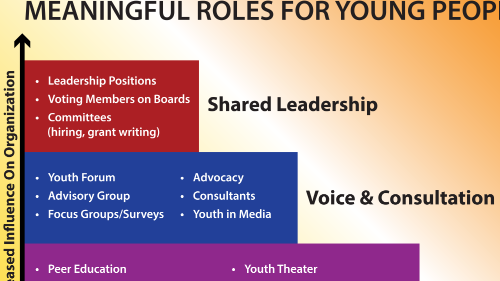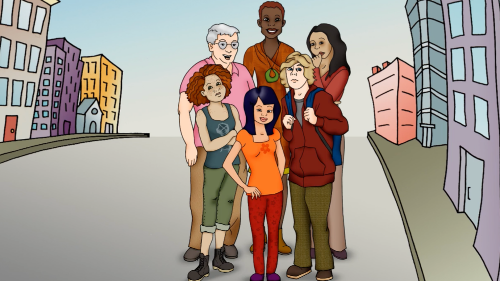Organizational Support for Positive Youth Development
Why is organizational support important?
Positive youth development (PYD) is a community-based approach that is rooted in relationships, program environments, and — critically — organizations.
ACT for Youth has promoted a PYD approach since our founding in 2000. We have worked closely with youth-serving organizations, developing training resources and strategies for community collaboration and youth engagement. Over the years, we have learned that if a new approach is to be adopted and sustained, new policies, practices, and support at the organizational level — not just the program level — are essential. PYD requires us to view and engage young people in ways that may be new to many people in the organization, and our organizations generally have not been built to be fully inclusive of youth.

Benefits to Organizations
- PYD promotes youth engagement. Authentic youth engagement enhances the organization's reputation in the community and opens doors to additional funding opportunities.
- PYD may reduce spending for costly prevention and intervention programs. Young people involved in PYD programs are less likely to engage in negative or risky behaviors.
- PYD strengthens young people's commitment to the agency. Youth participants may be the future employees and leaders of the agency.
- PYD is a research-informed — yet flexible — approach, not a prescriptive, expensive curriculum. PYD principles can be adapted to different types of programming and populations.
What if our PYD efforts don't have organizational support?
Consider a few examples of what can happen when organizational support is absent:
- A board member champions youth engagement by convincing the board to bring on two youth representatives. But because the board members have not taken a hard look at their own adultism, the young people are patronized, tokenized, and given no meaningful power. They don't return and board members assume it's because they are immature.
- An agency that wants to increase youth engagement begins by training its youth work professionals. Following PYD training, program staff are excited to create meaningful organizational roles for youth participants. They work with young people to generate a list of ideas for involving youth in program planning and evaluation as well as hiring staff. However, staff lack the power to put these roles in place, and agency leaders don't understand what the organization will gain by involving young people in decision making. The effort goes nowhere.
- An assessment of an organization's readiness to adopt a PYD approach reveals a need for training in developmental relationships. No budget line has been established for the PYD effort, and staff are unable to identify any high-quality free training. Program staff need buy-in from supervisors and leadership to institute changes, especially when organizational infrastructure such as budget lines are involved.
The Special Role of Supervisors
Supervisors play an important role in establishing innovative approaches. Supervisors can advocate for, create, and sustain the conditions that allow young people to have positive, developmental environments, experiences, and relationships.
They can create and advocate for positive environments for youth by establishing practices and policies that focus on safe and inclusive program settings, opportunities for youth, and staff engagement and community collaboration.
They can create and support positive experiences for youth by promoting quality programming, undertaking ongoing program improvement — preferably with youth and staff involvement, and supporting quality youth development professional staff.
They can create and support positive relationships with young people by promoting developmental relationships between staff and youth as well as creating opportunities for youth-adult partnerships. They can reimagine supervisory practice and thus their relationship with staff by integrating PYD principles such as a strength-based approach and experiential learning.
Resources: PYD in Organizations
Quality Self-Assessment Tool and Guide
The Quality Self-Assessment (QSA) tool and guide describe what quality looks like at progressive performance levels. The QSA is an in-depth process covering a full range of quality indicators; however it is possible to focus on selected elements of concern if completing the full assessment is not yet possible. New York State Network for Youth Success.
PYD Environmental Scan
This tool can be used to do an informal assessment of the physical environment and climate of the agency. It is based on many PYD trainings and discussions with youth work professionals. ACT for Youth.





